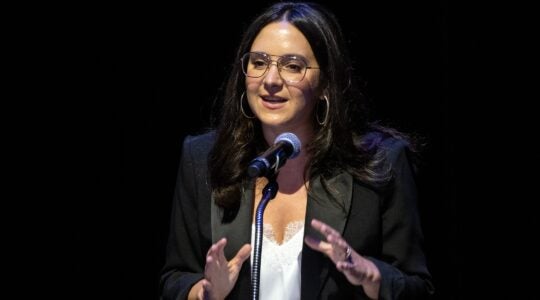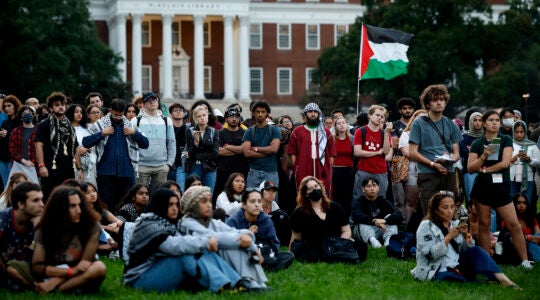NEW YORK (JTA) – Be afraid. Be very afraid.
Even if you converted to Judaism under Orthodox auspices, your conversion may be called into question by the Israeli Chief Rabbinate and the Rabbinical Council of America, the main centrist Orthodox rabbinical group in the United States.
If you live in Israel, this means your ability to marry a Jew is in jeopardy.
That’s the warning that some critics of the RCA are promoting following the airing of one woman’s story whose U.S. conversion as an infant some 35 years ago was questioned recently by the Israeli Rabbinate. When the RCA’s rabbinical court, the Beth Din of America, was asked by the Chief Rabbinate for input on the case involving Karen Brunwasser, it said it could not affirm the validity of her conversion.

The Rabbinical Council of America’s refusal to vouch for the validity of Karen Brunwasser’s conversion to Judaism nearly derailed her Aug. 29, 2013 wedding in Israel to Lior Shabo. (Yoram Amir)
The incident — which nearly derailed Brunwasser’s wedding to an Israeli Jew, according to a recent essay she published in the Washington Jewish Week — shows how much sway the RCA has when it comes to deciding the fates of converts, even ex post facto. The case also highlights the dangers of centralizing conversion authority, critics say, because converts who haven’t gone through the RCA’s approved process are unfairly suspect.
“When you’re centralizing authority, to whom are the people you’ve given this power responsible to?” Rabbi Avi Weiss, founder of the liberal Orthodox rabbinical school Yeshivat Chovevei Torah, told JTA. “A convert’s evaluation can continue till the end of their lives.”
Rabbi Shmuel Herzfeld, a Weiss ally who leads a Washington synagogue, argues that Brunwasser’s case has dramatic implications.
“We now know that the RCA is casting aspersions on prior conversions by its own members,” Herzfeld wrote in a March 6 JTA Op-Ed. “Despite what the RCA promised in 2008, it is retroactively negating and rooting out converts who were for decades fully integrated into the Orthodox Jewish community. In doing so, it has set a dangerous precedent that should make every convert afraid and all of us angry and disappointed in its leadership.”
In at least one respect, the RCA’s critics are right: Anyone whose conversion to Judaism predates the establishment in 2008 of RCA conversion guidelines called Geirus Policies and Standards (GPS), or whose conversion took place after 2008 but did not follow the GPS guidelines, may find his or her conversion subject to review. That’s the case even if the rabbi who presided over the conversion was an RCA member.
But while the critics lay blame on the GPS system, the RCA says this practice of review is nothing new: It always has responded to inquiries from the Israeli Rabbinate about conversions, and the review of old cases isn’t proactive but reactive — initiated only in cases where another rabbinate, in Israel or elsewhere, asks about a particular conversion. Furthermore, lack of affirmation of a conversion doesn’t equal annulment, the RCA says.
“The Beth Din of America cannot offer a blanket endorsement of conversions by members of the RCA, nor can it offer a blanket non-endorsement of conversions,” Rabbi Leonard Matanky, the RCA’s president, told JTA. “When asked, each case is reviewed individually.”
Because the RCA doesn’t police its members’ actions, the establishment of the GPS guidelines was an attempt to standardize conversion practices so the RCA could certify those conversions it deems kosher — much like a kashrut organization grants kosher certification. But as with kashrut, lack of certification doesn’t necessarily mean a particular conversion is unkosher.
“When asked to endorse a conversion done outside the GPS policy, whether before GPS or outside of GPS, the Beth Din of America will review each case and make a determination whether it abides by the GPS standards,” Matanky said. “Even when the beit din [religious court that performed the conversion] says it did not abide by GPS standards, it does not mean the conversion has been voided.”
But Weiss, whose own Orthodox rabbinic credentials came under scrutiny several months ago when the Israeli Rabbinate rejected a letter from him affirming the Jewishness of someone seeking to marry in Israel, says the RCA is unfairly applying tough new standards to old conversions.
“There’s no doubt their standards have changed,” Weiss said. “It’s one thing if somebody asks you to make an evaluation. But you’re evaluating conversions that took place 30 years ago, and your evaluation is based on your post-GPS standards. Had the RCA been asked about the conversion 20 or 30 years ago, the RCA would have signed off on it.”
Weiss says the RCA’s bid to centralize conversion authority has made conversion onerous for converts, particularly those who live in cities where religious courts, or beit dins, do not meet regularly.
Though an RCA member, Weiss has been at odds with the association since the early days of the liberal Orthodox rabbinical school he founded in 1999 in Riverdale, N.Y. Other moves by Weiss, to ordain Orthodox clergywomen and launch an alternative rabbinic organization, the International Rabbinic Fellowship, have added to the strain.
The controversy over the RCA is limited to the Orthodox community, but the implications of the Israeli Rabbinate’s decisions on converts are not. Non-Orthodox converts who want to marry a Jew-by-birth in Israel are pretty much up the creek: The Israeli Rabbinate, which has a monopoly over Jewish marriage in Israel, does not recognize non-Orthodox conversions at all.
With no civil marriage in the Jewish state, that leaves few options for couples in which one partner is recognized by the Rabbinate as a Jew and the other is not. The non-Jewish partner can undergo an Orthodox conversion, a lengthy process that requires committing to Orthodox Jewish practice. Or the couple can marry overseas, civilly or otherwise, and the marriage will be recognized by the Israeli Interior Ministry.
However, the Israeli Rabbinate won’t recognize the union, and if it’s the woman whose conversion did not pass muster in Israel, the Rabbinate won’t consider the couple’s children Jewish. That means the children will face the same obstacles when it comes time for them to marry.
In her Feb. 19 newspaper essay, Brunwasser highlighted how the RCA’s response to the Israeli Rabbinate’s inquiry about her conversion nearly wrecked her wedding. The RCA official who responded noted that some of the rabbis on the beit din that converted her had served in a synagogue without a mechitzah divider separating men and women.
“We are unable to approve conversion done by a rabbi who serves in a synagogue without a mechitzah even if the rabbi himself observes the Torah and mitzvot, and even if the acceptance of mitzvot by the convert was done appropriately,” Rabbi Michoel Zylberman of the RCA’s Beth Din of America wrote in a late-night email in Hebrew last Aug. 11. “As for this particular conversion, the first two signatories were Orthodox rabbis who served in a synagogue without a mechitzah. Of course, there is standing for a religious authority to differ, and if you’d like to be lenient and rely on other religious authorities, do as seems fit in your eyes.”
Brunwasser says the Rabbinate’s response was to require her to convert again. She refused. Only after intervention by “powerful connections that I unfortunately cannot disclose,” she wrote, did the Rabbinate confirm her original conversion, giving her a green light to marry. That affirmation came the day before her wedding.
Herzfeld argued that the RCA’s approach to Brunwasser’s case reflected a shift toward a more restrictive position, noting that in the past Orthodox rabbis more commonly served in synagogues without mechitzahs.
The RCA has declined to speak about Brunwasser or other specific cases, citing privacy concerns. But in at least one respect, the RCA now appears to be suggesting that Zylberman was not entirely accurate in characterizing the organization’s position on mechitzahs.
“The fact that a rabbi served in a non-mechitzah shul is a factor for consideration in determining the status of conversion but does not automatically invalidate a conversion,” Matanky said. “There are many other considerations that need to be taken into account.”
Despite the criticism, Matanky says the Brunwasser case actually undercuts the argument that the RCA holds too much sway over conversions, or that the RCA’s failure to endorse a conversion equals a repudiation. As trying as Brunwasser’s experience was, he pointed out, in the end her conversion was upheld.
JTA has documented Jewish history in real-time for over a century. Keep our journalism strong by joining us in supporting independent, award-winning reporting.





